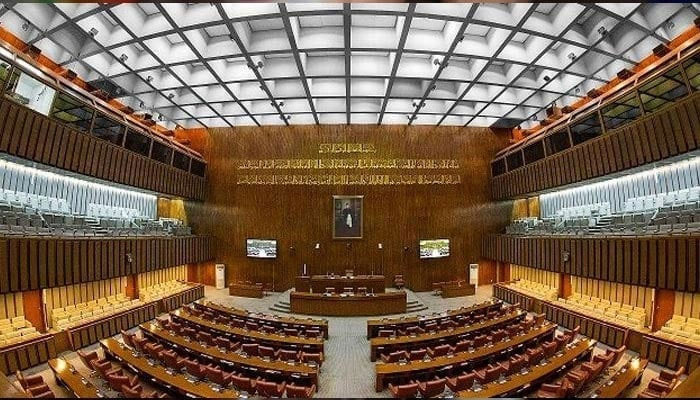Special powers for forces in Balochistan assailed in Senate
“Now, state institutions have been given a new free hand, with no accountability,” he remarked
ISLAMABAD: Opposing the decision to grant special powers to the army and civil armed forces in Balochistan, lawmakers in the Senate on Friday expressed fears that this move would further worsen the situation, particularly in light of the ongoing issue of missing persons, which has already inflamed tensions in the province.
After the question hour, National Party Senator Jan Muhammad raised the matter on a point of public importance, lamenting that after a detailed discussion in the House, the outcome was the extension of special powers to the security forces. He feared this step would aggravate the situation in Balochistan, where the issue of missing persons was already a major concern. Families of those who had disappeared had no information about their loved ones.
“Now, state institutions have been given a new free hand, with no accountability,” he remarked.
Senator Jan Muhammad said that Balochistan was already resembling a police state. He cited the recent arrest of his party’s vice president during a raid in Karachi, where, upon asking for a warrant, his head was smashed against the wall, leaving him profusely bleeding.
“These laws for Balochistan and Khyber Pakhtunkhwa will only create more problems. Issues cannot be resolved through arrests, force, and repression,” he asserted.
Aimal Wali Khan of the Awami National Party, fully supporting the Balochistan lawmakers, suggested they approach the Supreme Court to challenge the law allowing the detention of individuals for three months, arguing it conflicted with fundamental rights. He criticised the current government for lacking authority.
“There shouldn’t be anyone missing, not even for a day, yet many have been missing for years,” he said.
He also questioned how it would be determined who is a terrorist and who isn’t, accusing the state of using terrorism as a pretext for political manipulation and silencing dissent.
Aimal urged the government to reverse the decision to grant special powers to the armed forces and called for the dissolution of certain intelligence agencies that had failed in their duties, suggesting the funds be redirected for other purposes.
Paying tribute to Olympic hero Arshad Nadeem, Aimal expressed frustration that the people of Khyber Pakhtunkhwa and Balochistan are often neglected, while appreciation is reserved for those from Punjab. He highlighted other champions from the region, such as Zia Mashwani, who excelled in mixed martial arts in Asia; Amir Khan from Swat, a taekwondo champion; and Fahim Mehmood from Waziristan, who won a gold medal for Pakistan, yet their achievements received little recognition.
JUIF lawmaker Kamran Murtaza also condemned what he described as discriminatory treatment towards Balochistan. He noted that the outcome of a recent apex committee meeting in Quetta was the grant of special powers to security forces and restrictions on transport movement to daytime only. He questioned if the apex committee’s decisions had any legal backing.
“Through such measures, what message are we sending to the world? How can we expect any investment to come in? Balochistan is already a no-go area, and now it’s been given legal cover for actions that were already happening at will,” he lamented.
-
 Prince William Steps In To Help Farmer's Awareness Mission
Prince William Steps In To Help Farmer's Awareness Mission -
 Queen Elizabeth Tied To Andrew's Sexual Abuse Case Settlement: Report
Queen Elizabeth Tied To Andrew's Sexual Abuse Case Settlement: Report -
 Mark Ruffalo Urges Fans To Boycott Top AI Company Boycott
Mark Ruffalo Urges Fans To Boycott Top AI Company Boycott -
 Prince William Joins Esports Battle In Saudi Arabia
Prince William Joins Esports Battle In Saudi Arabia -
 Princess Beatrice, Eugenie Are Being Ripped Apart: ‘Their Relationship Is Fully Fractured’
Princess Beatrice, Eugenie Are Being Ripped Apart: ‘Their Relationship Is Fully Fractured’ -
 Arden Cho Shares Update On Search For ‘perfect’ Wedding Dress Ahead Of Italy Ceremony
Arden Cho Shares Update On Search For ‘perfect’ Wedding Dress Ahead Of Italy Ceremony -
 Ariana Madix Goes Unfiltered About Dating Life
Ariana Madix Goes Unfiltered About Dating Life -
 Prince William Closes Saudi Arabia Visit With Rare Desert Shot
Prince William Closes Saudi Arabia Visit With Rare Desert Shot -
 Priyanka Chopra Breaks Silence On Rumors Questioning Marriage To Nick Jonas
Priyanka Chopra Breaks Silence On Rumors Questioning Marriage To Nick Jonas -
 'King Charles Acts Fast Or Face Existential Crisis' Over Andrew Scandal
'King Charles Acts Fast Or Face Existential Crisis' Over Andrew Scandal -
 Brooklyn Beckham Charging Nearly £300 In Ticket Cost For Burger Festival
Brooklyn Beckham Charging Nearly £300 In Ticket Cost For Burger Festival -
 Prince William Makes Unexpected Stop At Local Market In Saudi Arabia
Prince William Makes Unexpected Stop At Local Market In Saudi Arabia -
 Zayn Malik Shares Important Update About His Love Life
Zayn Malik Shares Important Update About His Love Life -
 James Van Der Beek's Celebrity Pals Pen Touching Tribute After His Death
James Van Der Beek's Celebrity Pals Pen Touching Tribute After His Death -
 Kate Middleton, William Are Holding Onto Their Hats As Worse Gets Threatened: Behind The Veil Of Shame
Kate Middleton, William Are Holding Onto Their Hats As Worse Gets Threatened: Behind The Veil Of Shame -
 British Soap Awards Scrapped Again As ITV Confirms 2026 Hiatus
British Soap Awards Scrapped Again As ITV Confirms 2026 Hiatus




